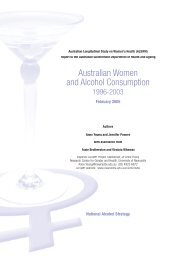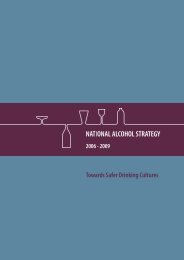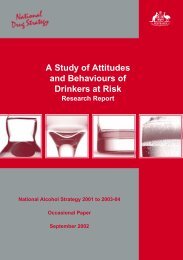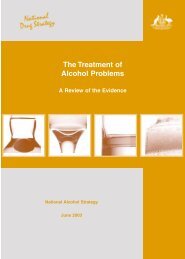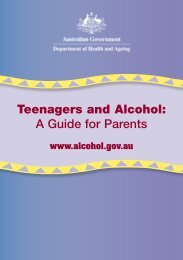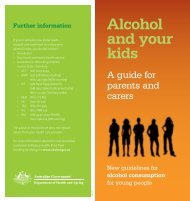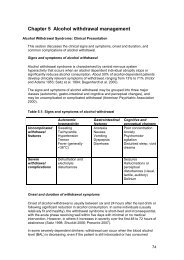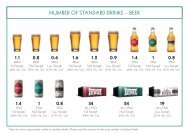Chapter 3 Screening, assessment and treatment planning - Alcohol
Chapter 3 Screening, assessment and treatment planning - Alcohol
Chapter 3 Screening, assessment and treatment planning - Alcohol
Create successful ePaper yourself
Turn your PDF publications into a flip-book with our unique Google optimized e-Paper software.
Gathering collateral informationExcessive alcohol use <strong>and</strong> its consequences are stigmatised problems that manypatients are reluctant to acknowledge. Collateral interviews play a central role wherethe patient does not self-report their use of alcohol or its consequences. Collateralinformation is particularly needed where a discrepancy appears likely.There are significant barriers that limit access to collateral reports, including legal(privacy legislation limits the distribution of personal information without consent),ethical <strong>and</strong> financial (the enquiry can be time consuming). Patients may object tosuch enquiries <strong>and</strong> the therapeutic relationship may be disrupted.Recommendation3.17 Collateral reports should be incorporated inthe <strong>assessment</strong> where inconsistencies appearlikely, with the patient’s permission wherepossible, <strong>and</strong> subject to legal <strong>and</strong> ethicalboundaries.Strength ofrecommendationSLevel ofevidenceFamily factorsPatients should be encouraged to explore relevant family issues during <strong>assessment</strong>including the relationships with their spouse or partner, their parents, their children,<strong>and</strong> other significant people in their lives including any attributions about the effectsof the patient’s drinking.Domestic violence <strong>and</strong> sexual abuse, either as perpetrator <strong>and</strong>/or victim, arecommon <strong>and</strong> serious problems associated with alcohol <strong>and</strong> other substance use.Because of the sensitivity of these issues, it may not be appropriate to raise them inthe first contact session unless there is reason to believe there may be a currentsafety risk. It is important to determine whether the patient wishes to discuss theseissues. Specialist <strong>assessment</strong> <strong>and</strong> intervention is typically required.When it is possible the clinician should interview the spouse or the family members.The family interview is an opportunity for family members to ask questions <strong>and</strong> tovoice their concerns. It may also help the family see the drinking problem inperspective.While this kind of complex information is best obtained by clinical interview, <strong>Alcohol</strong>Problems Questionnaire has a subscale assessing family problems <strong>and</strong> oneassessing marital/relationship problems (see Appendix) (Drummond 1990).Recommendation3.18 The social support for the patient should beassessed <strong>and</strong> this information should beincorporated into the management plan.3.19 Clinicians should determine if the patientcares for any children under the age of 16, <strong>and</strong>act according to jurisdictional guidelines if thereare any concerns about child welfare.Strength ofrecommendationSSLevel ofevidence36



